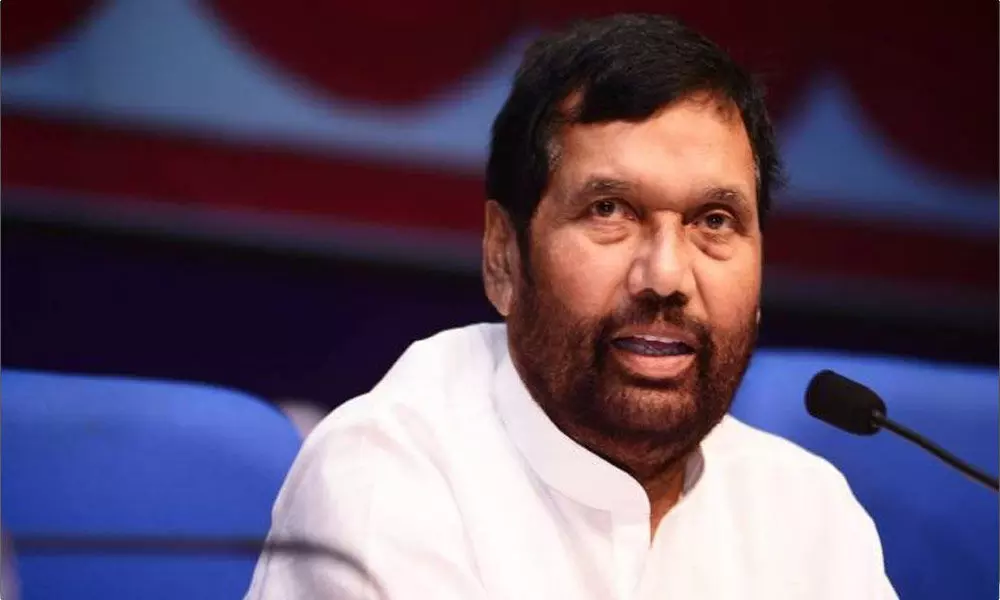Live
- Shiv Sena (UBT) to go solo in local and civic body polls in Maharashtra
- South Sudan targets 300,000 vulnerable people in new cholera vaccination drive
- Lal Bahadur Shastri Death Anniversary 2025: Honouring India’s Second Prime Minister and His Inspiring Words
- Pongal 2025: Celebrating Four Days of Gratitude, Harvest, and Togetherness
- The Countdown Begins: Ramayana: The Legend of Prince Rama Trailer Out Now
- AP to Attract ₹10 Lakh Cr Investment in Green Energy; Chandrababu
- Shiva, Sachin enter quarterfinals of men’s Boxing Nationals
- Clop lacks context, says DIG after video on conception lecture to schoolgirls goes viral
- Kolkata Police investigate Bengal-based NRIs abroad with fake Indian passports
- Chandrababu extends Sankranti greetings to Telugu people
Just In

Releasing a study on quality of piped drinking water being supplied in 21 cities across the country, Union Minister for Consumer Affairs, Food and Public Distribution Ram Vilas Paswan said on Saturday that in Delhi and 13 state capitals, tap water is "undrinkable".
New Delhi, Releasing a study on quality of piped drinking water being supplied in 21 cities across the country, Union Minister for Consumer Affairs, Food and Public Distribution Ram Vilas Paswan said on Saturday that in Delhi and 13 state capitals, tap water is "undrinkable".
The only metropolitan city where people can drink tap water safely is Mumbai as all its samples complied with Indian standards, the minister said.
"Samples were taken from 11 places in Delhi. All the samples have failed, But all samples of Mumbai are clear. Tap water of Mumbai is drinkable," said the Minister.
"None of the samples drawn from 13 of the state capitals -- Chandigarh, Thiruvananthapuram, Patna, Bhopal, Guwahati, Bengaluru, Gandhi Nagar, Lucknow, Jammu, Jaipur, Dehradun, Chennai and Kolkata -- complied with the requirements of the Indian Standard," said Paswan.
The minister said he has written to state governments asking them to clarify what help his government can provide to make tap water drinkable. "People should get pure water from the tap. There should be no water that causes diseases," he said.
The samples were taken from the capital city of 20 states apart from the national capital. "It was done in keeping with the objectives of the Jal Jeevan Mission of Prime Minister Narendra Modi," the minister said.
The minister said in the first phase, the samples of drinking water were drawn from various locations across Delhi and in the second phase, samples were drawn from 20 state capitals, and sent for testing as per Indian Standard.
In Europe and other developed countries, it is clearly written whether tap water is potable or not. In India, there is no such certification.
On the directions of the ministry, the Bureau of Indian Standards (BIS), a national body that makes quality standards for products and services, had decided to undertake a study of the quality of piped drinking water being supplied in the country. It has also framed quality standard for tap water.
The Indian Standard prescribes 48 parameters including radioactive substance but in the current study, radioactive substance test was excluded. Also free residual chlorine has been excluded from this exercise since it is applicable only when water is chlorinated and a minimum limit has been prescribed for it, the ministry said.
Testing was conducted for Organoleptic and Physical Tests, chemical test, toxic substances and bacteriological tests in the first stage.
"Test reports have been received for these tests for all the samples drawn. A vast majority of the samples have failed to comply with the requirements of Indian Standard in one or more parameters," the ministry said in a statement.
In the city of Delhi, all the 11 samples drawn did not comply with the requirements of the Indian Standard. The samples failed in several of the parameters. All the 10 samples drawn from Mumbai were found to comply with the requirements of the Indian Standard.
In the cities of Hyderabad, Bhubaneshwar, Ranchi, Raipur, Amravati and Shimla, one or more samples did not comply with the requirements of the Indian Standard.
"In the third phase, samples from capital cities of northeastern States and Smart Cities identified by Ministry of Housing and Urban Affairs have been drawn and are under tests. The results of these are expected by January 15, 2020, the ministry said.
In the fourth phase, it is proposed to test samples drawn from all the district headquarters of the country and their testing is planned to be completed by August 15, 2020.

© 2025 Hyderabad Media House Limited/The Hans India. All rights reserved. Powered by hocalwire.com






